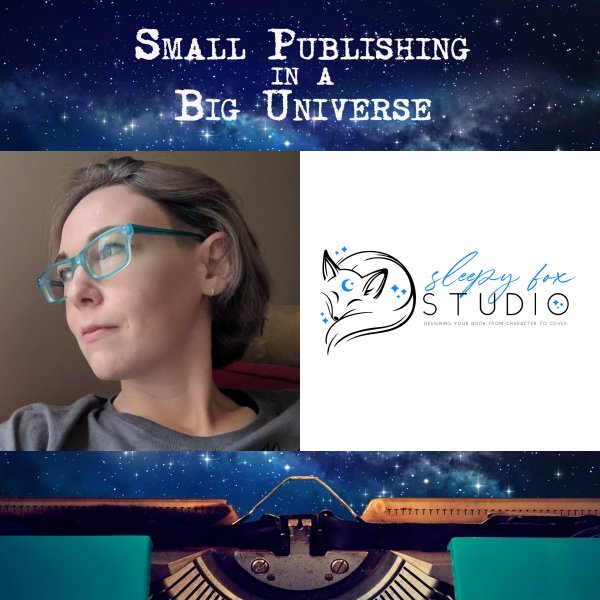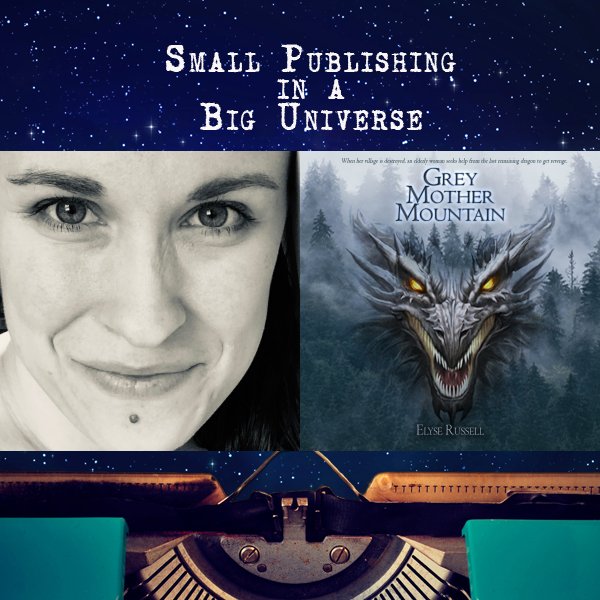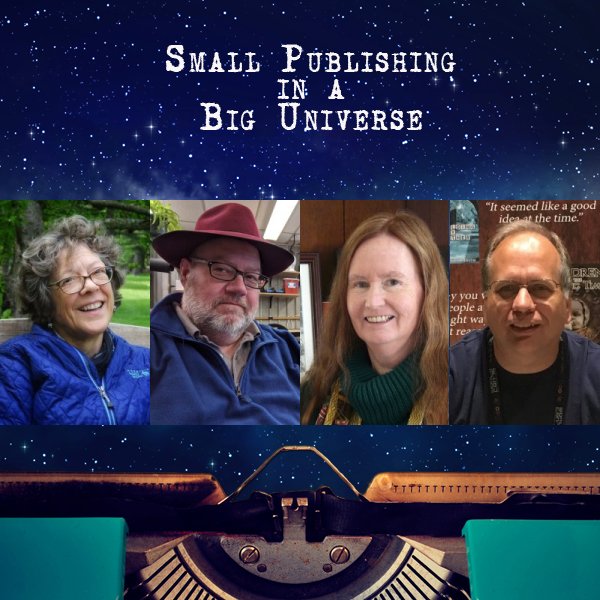[00:00:00] Speaker A: Foreign.
Hello and welcome to small publishing in a big Universe. I am your host, Lisa Jacob. This month we have an interview with author Terry Campbell. It's available now from our sponsors Water Dragon Publishing. Shun the Moon by Terry Campbell Peter Paper Angel Press Incident at Cougar Creek by Mary Floden Uncertainty Principles by Alan P. Marks from Cupid's Arrow Publishing, There Are Worse People by Irina Angelova and from Graveside Press, the Seething Below by Terry Campbell and Twisted Souls by Sky Crawford. Shun the Moon by Terry Campbell When Natasha, a three year old wolf hybrid, escapes her owner's yard for a fun frolic in the wilderness, she is assaulted by a vicious male wolf. An incident that plunges her into a world in which she unknowingly already existed, yet never appreciated the scope. Subsequent events release a swirl of human emotions, love, family, tragedy, loss and fear. And always looking in the background, powered by the moon is the terrifying beast who now claims her as his own.
Shun the Moon by Terry Campbell is available in hardcover, paperback and ebook editions from Amazon, Barnes and Noble and online booksellers such as Smashwords and Kobo. Or support your local independent bookstore by ordering it through bookshop.org this is small.
[00:01:49] Speaker B: Publishing in a big universe and I.
[00:01:51] Speaker C: Have with me hi, my name is Terry Campbell from McKinney, Texas.
[00:01:55] Speaker B: You have a book just now with.
[00:01:57] Speaker C: Water Dragon is publishing my werewolf novel Shun the Moon. Tell me about the book Shun the Moon. It's a werewolf, sort of a romance. Doesn't really start out that way, but there's some what I think are some new ideas in the genre of werewolves. It centers around a wolf hybrid who does not realize that she is a lycanthrope until she experiences a traumatic experience. And it sets a lot of things off in motion and it covers it's like a 10 year journey throughout the story.
I wrote it back in my first part of my writing career. I think I tried it with an agent or two but never had submitted it anywhere. And so when I revamped my career I sent it to Graveside and they liked it, but they didn't think it was horror enough, so they forwarded it on to Water Dragon and Water Dragon evidently liked it. So I'm very excited about seeing it in print.
[00:02:55] Speaker B: What inspired you to start writing the story in the first place?
[00:02:57] Speaker C: Oh, well, when I first started writing well as a child, it was always the universal monster movies, the twilight zones, the night galleries and stuff like that started pushing me that way.
And then when I was in high school I discovered Stephen King, started reading that. And then from there I went to Bradbury. Dan Simmons, Robert McCammon, Ronald Kelly, who also had a long writing hiatus. Those were my big inspirations. And then when I was younger, in my first writing career, I loved exploring and still do old towns, the history of them, old cemeteries, and photographing and just getting out and exploring. That's all giving me some good fodder for some story ideas.
[00:03:41] Speaker B: So you've mentioned your first writing career, second writing career in the hiatus. What got you first inspired to write in the first place? When did you start writing?
[00:03:50] Speaker C: I started writing, I'm gonna say it was probably about 1989. I mean, as a kid I would goof around writing little things. I started a Bigfoot novel when I was probably 10. I didn't know what I was doing, just writing stuff out longhand on notebook paper. I started like a dean demon falls in love with a mortal woman kind of story, but they never got finished. I did little things like that. But somewhere around 1989, I had a friend that always said he wanted to be a writer and he had a computer and he talked about it, but he never wrote anything. And then I got to thinking about it and I said, I'm gonna write a little short story and just see where it goes. And. And it was horrible. I still have it in a notebook somewhere. It's not even repairable. I don't think that started the ball rolling. And then frequented bookstores a lot. Back when we had bookstores, I came across the novel and short story market and I bought a copy of those. And then I was looking through there and then I started submitting a few stories and had a lot of rejections. But then I finally had my first acceptance. And then slowly but surely more of them started trickling in. I guess from about 1990 to about 2002, 2003, I was writing a lot and I had probably close to 50 short stories published. Most of them were in small press magazines of the day, but there were a few mass mark you actually saw in bookstores. But then I got married to my first wife. Well, that was in 97. And I still wrote a little bit, but it was like less and less and less. And then the marriage went bad and then I just lost any desire to do it. So I didn't do anything creative for probably five or six years. And then when I met my current wife, I got into art. I've always been an artist as well. And I got into oil painting and I was taking classes and I was having a lot of fun with that. So I was being creative again. And then in 2023, I had a weird dream and I thought that'd be a good story. The funny thing is, through all of that time, I wasn't putting stuff on a computer or on paper, but I was always writing in my head still and always thinking about some of the ideas I had and even jotting little notes down every now and then. But when I had that weird dream, we didn't even own a computer at the time. We were doing everything on our phones. My wife bought me a little laptop and I sat down and I. I started writing again. And I wrote a. An entire weird western novel because I was getting into the westerns. Horror, then the splatter Westerns, I'm sure you've heard of the term that started me up again. And I haven't stopped.
[00:06:15] Speaker B: I have a little similar page in my life where I wasn't writing for myself. That was the time when I was the most depressed. Did you also suffer some emotional trauma, like during that time when you're a creative person not creating, right?
[00:06:30] Speaker C: Exactly. Yeah. I think that's what. When my first marriage went source and all of the sacrifices I made to try to save it. Yeah. I don't know if it was depression. It was not thinking creatively at all for the longest.
[00:06:43] Speaker B: When you were writing when you were younger, was there a mentor or a teacher or anybody that provided a key encouragement that maybe gave you the hint that you maybe had some talent there?
[00:06:53] Speaker C: Well, yeah, actually a really good friend of mine, his name is Scott Madison Brent. He is also a writer. He was one of the people that I used to explore with.
Or the main one. We'd go. We called it Graveyard. And at night with our mag lights and we were just driving around and down the rural back roads. Oh, here's one. We'd get out, check out the cemetery, and we'd shoot ideas back and forth off each other, read each other Eddie, edit each other's stories. And he never did stop writing. So he's got a lot of short stories and he's got a story coming out in Ellery Queen's Mystery magazine. Mainly just him. I didn't take any kind of writing classes or it was just that and reading and writing and doing my own thing.
[00:07:34] Speaker B: So when you reignited your creative spark and you. You had a dream and you started writing that story, what was it that brought you back to the story that you'd started, your first time? That's the story that's coming out now. Right.
[00:07:47] Speaker C: That novel Shun the Moon was. Was completely finished in the 90s. I published in 2023 another novel that I wrote in the 90s called Kindred Feather. So I was thinking, okay, I'll do the same thing with the Moon. So I got it out and went through it again and made some changes, did some more edit and by that time I was getting some acceptances to anthologies here and there with short stories. So I said okay, I'm going to try a publisher with this one instead of doing self publishing. And it worked out how have you.
[00:08:18] Speaker B: Enjoyed working with Water Dragon?
[00:08:21] Speaker C: Very much so. Water Dragon. I'm sure they're going to be just as dependable as the Graveside because they're the same guys and girls.
[00:08:29] Speaker B: What do you have coming out with Graveside?
[00:08:31] Speaker C: Tiny Terrors Sandalone coming out called the Seething Below. That's one of my older short stories from my earlier days that I took out and tweaked and edited and changed up some stuff. And then next year I have another Tiny Terrors. It's four story Weird Western. They're all separate stories. There's no tie ins to any of them other than some of the anthologies that are coming out from Graveside. I'm in. I'm in the Cryptid and the Cosmic Horror and the Illustrated Poetry.
[00:08:59] Speaker B: Let's go back to process. You plotted it out really thoroughly and had a really solid plan going to it. And now this next one that you're working on, it's much more seat of your pants. It's going with whatever you see comes next. How do you feel about the different processes? And as you're going forward, do you think you're going to do more see to your pants or are you going to do more heavily plotted?
[00:09:20] Speaker C: Well, I think that remains to be seen. I think I will always prefer the mapping it out with the cards and by chapter and what scene happens in what chapter. I kind of just experimenting with this new one just to see if I can do it that way. And part of it I got a little impatient. I was eager to get it started and because I don't really know everything that's going to happen yet, I said well, there's no point in putting out note cards if I don't know what's happening yet. But I know how it starts and basically kind of how it finishes. So I said hey, I can fill in the rest of it as I go, so I'll see if that works or not. I'm hoping to submit that one to Graveside because my goal I want a novel from Graveside because I really love the way their novels look.
[00:10:05] Speaker B: So one of the questions I like to ask everybody is what is your writing advice that you would give to up and coming writer that's maybe not as far along as you are.
[00:10:14] Speaker C: Oh, 100%. Just write it. Just get it down on paper, as crappy as it might be. Get the idea out of your head on paper and it can always be tweaked and fixed, fixed and made better. If it doesn't get physically put on, it's never going to happen. You've got to start no matter how bad you think it's going to be, no matter how bad it may turn out to be. And it may never get better, but you're never going to know if you don't do it.
[00:10:37] Speaker B: Thank you so much for meeting with me. Good luck with your books.
[00:10:40] Speaker C: Thank you.
[00:10:47] Speaker A: Incident at Cougar Creek by Mary Flodin In Cougar Creek Coastal Ranch National Monument, a brutal murder and a supernatural secret bring together a Fish and Wildlife ranger and an indigenous woman to find the monster who killed her mother.
At the intersection of echo, thriller and romantasy, Incident at Cougar Creek posits the fantastical question, can mutations in epigenetic DNA activated by the recent wave of climate havoc induced pandemics and turn humans into shapeshifters? Incident at Cougar Creek by Mary Flodin is available in hardcover, paperback and ebook editions from Amazon, Barnes and Noble and online booksellers such as Smashwords and Kobo. Or support your local independent bookstore by ordering it through bookshop.org.
Thanks again to our guest. We plan on publishing a new episode every month. If you want to know more about small publishing in a Big universe, visit our
[email protected] and subscribe to our newsletter.
Send us your feedback by using the Contact Us link Like us on Facebook PBUpodcast.
To find out more about the books and other products featured during this episode, please visit the Small Publishing in a Big Universe
[email protected] this podcast was edited by Lisa Jacob. Executive Producer is Steven Radecki. Theme and ad music is provided by melodyloops. This month's episode was sponsored by Paper Angel Press, Cupid's Arrow Publishing, Graveside Press, and Water Dragon Publishing. Listen to our podcast on Apple Podcasts, Spotify, Amazon Music, and most of your favorite podcast services.
Thank you very much for listening and see you next month.


